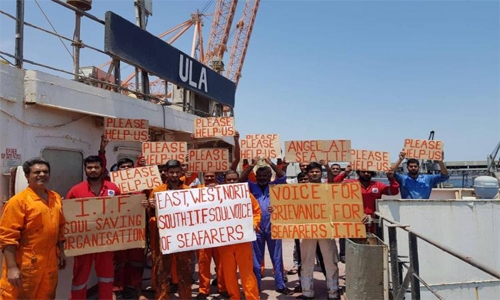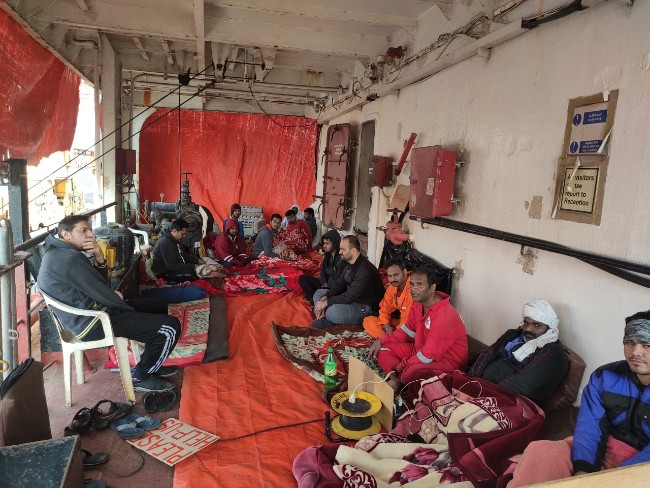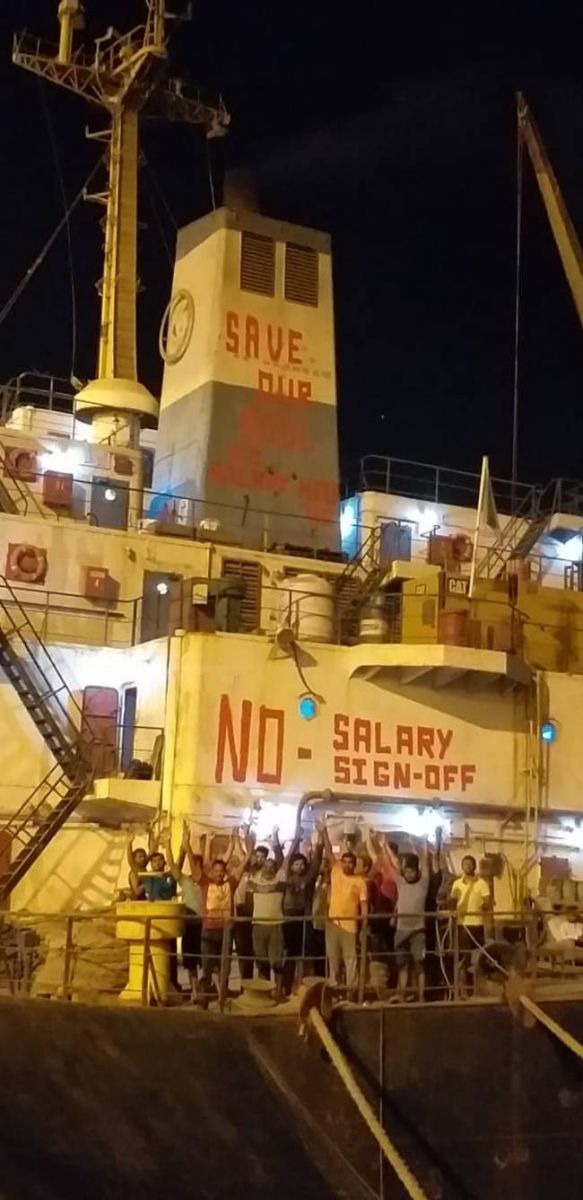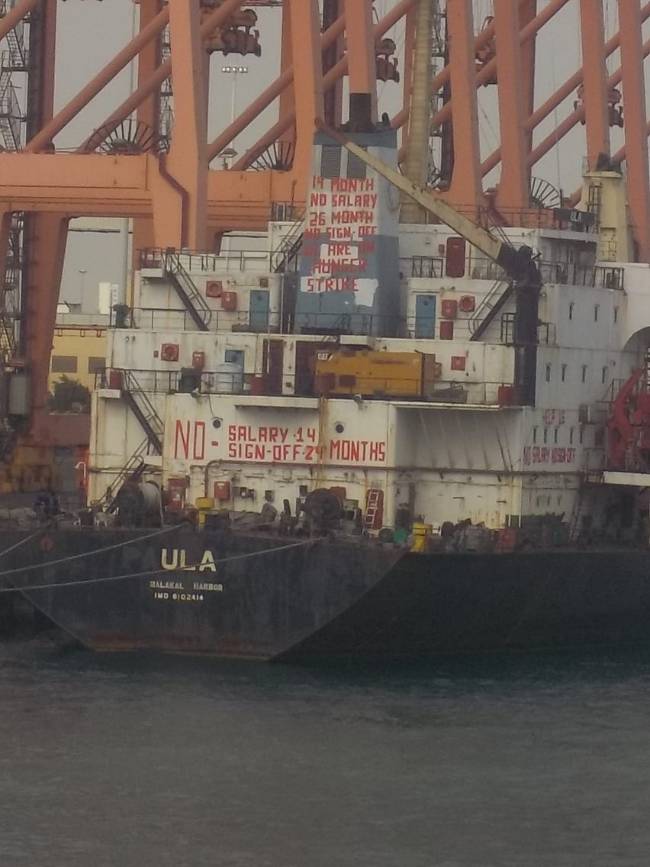Stuck on a ship in Kuwait, Indian sailors go on fast demanding pending salaries
The News Minute | Kuwait
The Daily Tribune – www.newsofbahrain.com
For the past nine months, Santhosh*, a seafarer from Srikakulam in Andhra Pradesh, has been stuck in limbo along with 18 other crew members on board the ship MV ULA. For reasons beyond their control, they have remained anchored at the Port of Shuaiba in Kuwait since March 2020. However, they had stopped receiving their salaries even before that. Santhosh was promised a monthly wage of US $400, which he hasn’t received in 11 months, since February. Some of his crewmates haven’t been paid in as long as 14 months.
Vexed with the delay in bureaucratic procedures and worried for their families whose financial woes have worsened over the months, the crew members have been on hunger strike for the past 18 days, despite the fatigue of having been on board the ship for more than a year. They have been demanding their pending salaries for the entire period they’ve remained on board, before signing off from the ship.
The crew members say that they had been suffering from medical problems on the ship since October 2019, after the vessel began its journey from Oman, due to lack of medicines, fresh water and provisions on board, apart from prolonged blackouts. As their demands for pending wages and provisions grew louder, in February they reached an arrangement with the owner of the ship. Provisions were sent and pending salaries were paid to some of them. Tired of the working conditions, some of the crew members sought to sign off from the ship after reaching the Port of Shuaiba in Kuwait, once the crew was changed and their positions were replaced.
Due to the coronavirus pandemic, the crew could not be changed. This was followed by complications with the cargo in the ship (clinker). Eventually, there was no buyer for the cargo, and by August 2020, the ship was disowned, or abandoned, by its owner. By then, some of the crew members had terminated their contract with the company for various reasons, and there were 19 crew members left on board. Sixteen of them are from India, while one in Turkey, one from Azerbaijan and one from Bangladesh. Despite personal tragedies in some of their lives, like losing loved ones back home, they were unable to return home, says Santhosh.
The Kuwait Ports Authority (KPA) then assumed control of the ship, and since then, the crew has been receiving provisions, drinking water and electricity from Kuwaiti authorities. But they still haven’t received any wages, and for most of them, who had already taken loans to pay agents who got them the job, more loans were piling up at home, and their financial situation has aggravated.
“We haven’t been able to send money to our families. Many of our family members have borrowed money from banks, or taken personal loans. Our families are waiting for us to pay for those loans. We want our pending salaries, else our lives will be miserable when we go home,” said one of the crew members, who has been on hunger strike for 18 days. He went on to say that it seems like a better option for them to end their lives on the ship than go home empty-handed. “The lenders will not spare us, as loans are pending from 14 months. We will not disembark or sign off until we get our pending salaries,” he said.
While the ship has been at the Shuaiba port for nearly nine months, crew members say that there has been talking lately of the port authorities possibly selling off the cargo, after which the crew would be sent home. However, the crew members are adamant about not returning empty-handed. With a rising sense of despair and helplessness, the 19 crew members began a hunger strike on January 7 demanding pending salaries. They say that they have only been surviving on water and ORS (oral rehydration solution) for the past 18 days. “Since our families are starving back home, we don’t want to eat either,” a crew member said
On the other hand, there are also a few crew members who were willing to sign off earlier but haven’t been able to do so because of the minimum safe manning requirement of the ship. In this case, the certificate requires that at least 12 crew members who perform certain tasks must be on board, according to a crew member, and in the absence of a replacement crew, they have been obliged to remain on board.
The ship had been navigating under the flag of the Republic of Palau, an island country where the ship had been registered. Palau terminated the registration of the ship in September 2020, after the expiry of its registration certificates, rendering it flagless. The IGP&I had previously suggested that Palau review its list of approved insurers if they have grounds to believe that the insurer of ULA had evaded its obligations under the ILO’s Maritime Labour Convention.
“A ship is like an island of the country where it’s registered, but it becomes very easy to abandon it in such situations,” says Manoj.
According to ILO, as of January 6, the Government of India had said that once Kuwait authorities resume the visa application process that was suspended because of the pandemic, the Indian Registered Recruitment and Placements (RPS) Agencies that had engaged the crew would ensure that they are relieved from the ship and repatriated, with their wages fully settled. The Directorate General of Shipping has said that it has requested Kuwait authorities to take up the matter with the Kuwait Ports Authority for settlement of wages and early repatriation of Indian seafarers, and also intervene with the owners of the vessel for settlement of the outstanding wages.
Manoj says that while most ports are not very supportive, the Kuwait Port Authorities have been helpful to the seafarers, providing them adequate basic necessities. However, they are not responsible for paying their salaries, he adds. “But here, since there’s cargo, the port may be able to support them after it is sold. However, once the seafarers are signed off and leave the ship, there’s no guarantee that they will get their salaries later,” he says.
With their financial situation exacerbated by the pandemic, the seafarers are in desperate need of their salaries, as they haven’t been paid in almost a year.
Holding the shipowner accountable in such situations is extremely difficult, according to Manoj. “It’s difficult to even find them. From the ship’s registered address, there’s a chain to the final owner that can be hard to trace,” he says. According to ILO’s database, the Qatar government has said that they had initiated action against the chairman of the company that previously owned the ship. It also said that several arrest warrants have already been issued against the chairman, and the company has been blacklisted since February 2017. However, as of October 2020, authorities were not able to capture the chairman.
Manoj says that incidents like these must act as a wake-up call for ILO and other maritime stakeholders to address the gaps in the implementation of maritime labour laws. “Often, unscrupulous ship owners and exploitative agents who help them hire seafarers to get away with their offences relatively easily. It’s the crew members who are most vulnerable, and are penalised the most,” he says.
Shaheen Sayeed, an activist who has worked with stranded seafarers on multiple occasions, notes that becoming a seafarer involves huge investment. “To be a seafarer, one has to spend around Rs 5 to 6 lakh for education. Agents who promise lucrative foreign jobs to Indian seafarers also collect around Rs 3 to 4 lakh for a job. After spending so much money, very few succeed, while some, as in the case of ULA, are stuck in abandoned ships without salaries for more than a year. The seafarers complain that what they are going through is modern-day slavery,” she says.
However, there is still hope in this case, Manoj says than many other episodes that are far more distressing. “Right now, at least there’s a possibility of the cargo being sold and the seafarers being repatriated with partial salaries,” he says.
Related Posts




